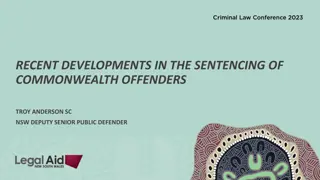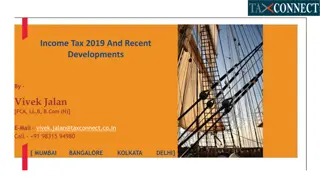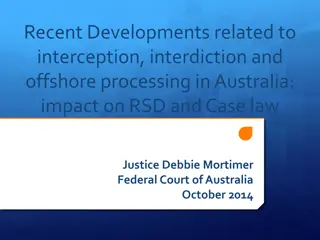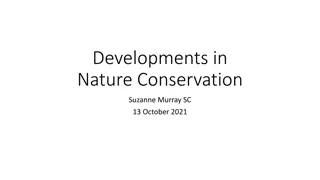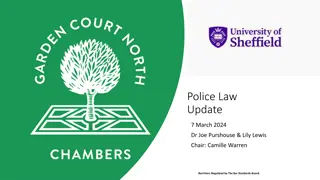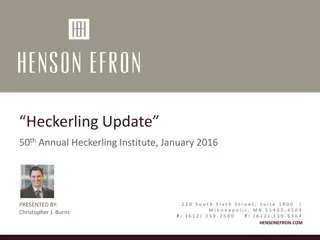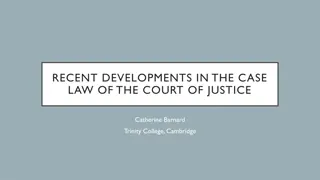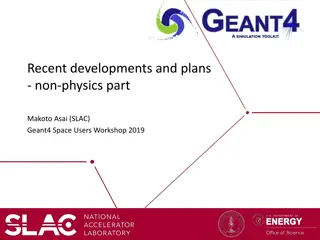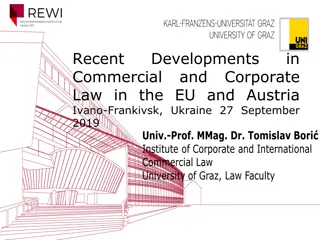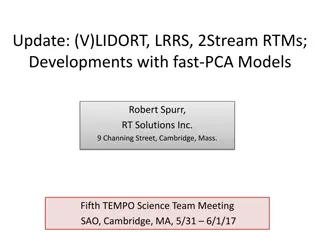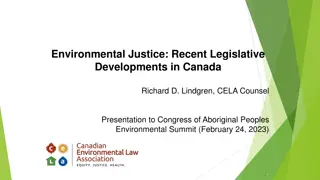Recent Developments in Case Law
Explore the latest case law updates including rulings on unreasonable searches and seizures, warrantless tracking through GPS, cell phone searches, double jeopardy, and more. Dive into key legal issues and court decisions shaping law enforcement practices and individual rights.
Download Presentation

Please find below an Image/Link to download the presentation.
The content on the website is provided AS IS for your information and personal use only. It may not be sold, licensed, or shared on other websites without obtaining consent from the author.If you encounter any issues during the download, it is possible that the publisher has removed the file from their server.
You are allowed to download the files provided on this website for personal or commercial use, subject to the condition that they are used lawfully. All files are the property of their respective owners.
The content on the website is provided AS IS for your information and personal use only. It may not be sold, licensed, or shared on other websites without obtaining consent from the author.
E N D
Presentation Transcript
CASE LAW UPDATE What s new and exciting?
4TH Unreasonable searches and seizures AMENDMENT
RODRIGUEZ V. U.S., 575 U.S. ___ (2015). Issue: After a traffic stop and without reasonable suspicion or a warrant, may an officer conduct a dog sniff? Holding: No. (6-3) The purpose of the stop determines the duration of the detention.
GRADY V. NORTH CAROLINA, 575 U.S. ___, (2015). Issue: Does the warrantless tracking of a sex offender through GPS constitute a search? Holding? Yes (per curiam). Didn t follow rule in US. v Jones Physical occupation on private property for the purpose of obtaining information.
RILEY V. CALIFORNIA, 573 U.S.___ (2014); (U.S. V. WURIE) Issue: May an officer search a cell phone without a warrant under SITA? Holding: No. Searching a cell phone does not support the purpose of SITA: protect officers and/or protect evidence.
STATE V. GRANVILLE, 423 S.W.3D 399 STATE V. GRANVILLE, 423 S.W.3D 399 (TEX. CRIM. APP. 2014). (TEX. CRIM. APP. 2014). Issue: May an officer view the contents of phone without a warrant if the phone is in property in the jail? Holding: No. Pants can never be a cell phone!
EX PARTE BENSON, NO. WR-81,764-01 (TEX. CRIM. APP. 2015) Issue: Are intoxication manslaughter and felony DWI considered to be the same crime under double jeopardy? Holding: No. Two Part Test Elements Test under Blockburger: Do each of these offenses require proof of a fact that the other does not? Did the legislature intend for the offenses to be treated as the same? Even if an analysis of the Ervin factors were inconclusive, applicant s double-jeopardy claim would fail, because the presumption established by the offenses having different elements under the Blockburger analysis would remain unrebutted. When the Blockburger same-elements test 136 indicates that the offenses are different, the evidence that the legislature intended only one punishment must be clear in order to rebut that presumption. Whatever else one might say, one 137 cannot say that the legislature clearly intended only one punishment for the offenses of felony DWI and intoxication assault.
MURRAY V. STATE, PD-1230-14 (TEX. APP.- AMARILLO [7THDIST.] 2015). Issue: Was there sufficient evidence to find that a defendant who was passed out in the driver s seat of a running vehicle had operated the vehicle? Holding: Yes. Sufficiency of evidence standard Court must assume factual disputes were resolved in favor of the verdict
RODRIGUEZ V. STATE, NO. 01-12-00970- CR (TEX. APP.-- HOUSTON [1ST DIST.] 2015). Issue: Does one have a reasonable expectation of privacy in blood drawn for medical purposes? Holding: No. The blood test was initiated by medical personnel and not law enforcement. D failed to prove that society would find it reasonable.
STATE V. MUNOZ, 08-13-00164-CR, (TEX. APP.- EL PASO [8THDIST.] 2015). Issue: Can the State rely on Transportation Code 724.012(b)(3)(B) for a warrantless blood draw? Holding: No. Under McNeely, there is no exigency for the dissipation of alcohol from blood. (retroactively applied no good faith reliance exception).
IMMIGRATION Mellouli v. Lynch, 525 U.S. ____ (2015). (7-2) Issue: To trigger deportability under the Immigration and Nationality Act, must the government prove the connection between a drug paraphernalia conviction and a substance listed in the Controlled Substances Act? Holding: Yes. He was not deportable because his conviction was for a drug not specifically listed in the CSA Dissent: argues that relates means any connection
OUTCRY STATEMENTS Ohio v. Clark, 576 U.S. ____ (2015). (9-0) Issue: (1)Does a requirement that a person report child abuse render the person law enforcement for confrontation purposes? (2)Are statements to a teacher by a student considered testimonial? Holding: (1) No. And mandatory reporting statutes alone cannot convert a conversation between a concerned teacher and her student into a law enforcement mission aimed primarily at gathering evidence for a prosecution. (2) No. The purpose of the conversation was to protect the child and not gather testimony.
LETHAL INJECTION Glossip v. Gross, 576 U.S. ___ (2015) (5-4) Issue: Does Oklahoma s use of midazolam as the initial drug in the execution protocol, the same initial drug used in Clayton Lockett's execution, violate the Eighth Amendment s prohibition against cruel and unusual punishment? Holding: No. Insufficient evidence that it causes pain; 8thdoes not guarantee no pain at all Finally, we find it appropriate to respond to the principal dissent s groundless suggestion that our decision is tantamount to allowing prisoners to be drawn and quartered, slowly tortured to death, or actually burned at the stake. That is simply not true, and the principal dissent s resort to this outlandish rhetoric reveals the weakness of its legal arguments. The response is also familiar: A vocal minority of the Court, waving over their heads a ream of the most recent abolitionist studies (a superabundant genre) as though they have discovered the lost folios of Shakespeare, insist that now, at long last, the death penalty must be abolished for good. Mind you, not once in the history of the American Republic has this Court ever suggested the death penalty is categorically impermissible. The reason is obvious: It is impossible to hold unconstitutional that which the Constitution explicitly contemplates. Scalia, concurring
RESTITUTION Hanna v. State, 426 S.W.3d 87 (Tex. Crim. App. 2014). Issue: In order to be eligible for restitution, must a victim be specifically named in the charging instrument? Holding: No. If damage is caused, even in victimless crimes, then restitution may be ordered.
CONDUCT ORIENTED VS. RESULT ORIENTED Price v. State, PD-0383-14 (Tex. Crim. App. 2015). Issue: In an assault family violence (strangulation) case, must the jury instruction attach a culpable mental state to the manner and means of strangulation? Holding: No. FV asauslt is a result oriented crime because the gravamen focuses on the result, bodily injury, and not the cause, manner and means.
AUTHENTICATION Butler v. State, No. PD-0456-14 (Tex. Crim. App. 2015). Issue: Is a witness s testimony enough to authenticate text messages? Holding: Yes, if the testimony can bridge the gap between ownership of the phone and the person actually sending the texts Although Salas s responses are not without ambiguity, a 9 rational jury could conclude that Salas recognized the texts to be coming from Appellant on this occasion (and not someone else who might have purloined his phone) because: (1) he had called her from that number on past occasions; (2) the content and context of the text messages convinced her that the messages were from him; and (3) he actually called her from that same phone number during the course of that very text message exchange. R.EVID. 901. It requires merely sufficient evidence to support authentication. It does not ordinarily require the trial court to make a threshold determination of the credibility of the evidence proffered by the proponent to establish authenticity.
ELECTION; UNANIMOUS VERDICT Ansari v. State, No. 04-14-00728-CR (Tex. App.- San Antonio [4thdist.] 2015). Issue: Did the trial court err in failing to give an incident-unanimity instruction? Holding: Yes. The unanimity requirement ensures the jury agrees on the factual element underlying the charged offense, not that it merely agrees that a statute was violated. Solution: Elect or charge one
UNANIMOUS VERDICT: CONTINUOUS SEXUAL ASSAULT Holton v. State, No. 08-13-00220-CR (El Paso 8coa 2015). Issue: : Is Penal Code 21.02 (Continuous Sexual Abuse a Young Child) unconstitutional because it does not require jury unanimity regarding which acts of sexual abuse were committed? Holding: No. [A] defendant s constitutional right to a unanimous jury verdict is fulfilled by requiring the jury to agree on the key element of the offense, i.e., that the defendant committed a series of acts within a certain period of time, and that jury unanimity is not required regarding which of the particular acts of sexual abuse the defendant committed.
EXTRANEOUS CONDUCT Belcher v. State, No. 12-14-00115-CR (Tyler, 12coa 2015). Issue: Is CCP Art. 38.37, allowing evidence of extraneous offense or acts against children, constitutional? Holding: Yes. 38.37 is constitutional so long as a 403 balancing test is conducted prior to admission of extraneous conduct and the state gives the defense 30 days notice. The extraneous offense evidence was highly prejudicial, principally because it was especially probative of Appellant s propensity to sexually assault children. The trial court did not abuse its discretion in determining that the probative value of the extraneous offense evidence was not substantially outweighed by the danger of unfair prejudice. Note: State failed to give 30 days notice as the statute requires but D failed to object snooze you lose!
PROSECUTORIAL MISCONDUCT United States v. Bowen, No. 13- 31078 (5thCir. 2015). Issue: Did the trial court err in granting a new trial? Holding: No. conduct was egregious Finally, the inevitable impression left by the government s misconduct and ongoing pettifoggery is of a prosecution determined to convict these defendants by any means. Rule: social media is the devil! Don t be tempted.
TEXAS LEGISLATIVE UPDATE
HB 207 VOYEURISM. (a) A person commits an offense if, with the intent to arouse or gratify the sexual desire of the actor or to degrade or abuse any person, the actor observes another person without the other person's consent while the other person is in a dwelling, structure, or conveyance in which the other person has a reasonable expectation of privacy. Punishment Class C Class B if two or more priors SJ if victim is 14yrs or younger
SB 1135 (REVENGE PORN) Creates criminal and civil penalties Sec. 21.16. Pen. Code UNLAWFUL DISCLOSURE OR PROMOTION OF INTIMATE VISUAL MATERIAL. Sec. 98B.002.CPRC LIABILITY FOR PROMOTION OF CERTAIN INTIMATE VISUAL MATERIAL.
HB 3724 BE IT ENACTED BY THE LEGISLATURE OF THE STATE OF TEXAS: SECTION 1. Article 11.073(d), Code of Criminal Procedure, is amended to read as follows: (d) In making a finding as to whether relevant scientific evidence was not ascertainable through the exercise of reasonable diligence on or before a specific date, the court shall consider whether the field of scientific knowledge, a testifying expert's scientific knowledge, or a scientific method on which the relevant scientific evidence is based has changed since: (1) the applicable trial date or dates, for a determination made with respect to an original application; or (2) the date on which the original application or a previously considered application, as applicable, was filed, for a determination made with respect to a subsequent application. Provides an avenue for a convicted person to have the case reexamined when the expert that testified at the trial changes his opinion.
SB 817 Adds applicant to definition of dating violence Requires court to consider when deciding custody prior family violence, history/pattern of child abuse, and If a protective order was ordered
HB 910, SB 11 I hope you stay tuned as the Texas State marching band does its salute to gun racks and open beverage containers; which is only legal in Texas. Open carry, begins January 1, 2016 College carry
MARIJUANA HB2165: failed bill that would have made Texas = Colorado HB 339: legalized low TCH level with prescription for epilepsy SB 173: bans sale, manufacture, possession, and use of all synthetic marijuana
HB 2398 Decriminalizes truancy for kids Punishes parents by fine only, in an amount not to exceed: $100 for a first offense; $200 for a second offense; $300 for a third offense; $400 for a fourth offense; $500 for a fifth or subsequent offense.

 undefined
undefined

 undefined
undefined


